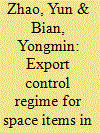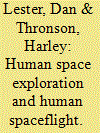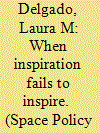|
|
|
Sort Order |
|
|
|
Items / Page
|
|
|
|
|
|
|
| Srl | Item |
| 1 |
ID:
106908


|
|
|
|
|
| Publication |
2011.
|
| Summary/Abstract |
The high cost of launching payloads into orbit - roughly $20,000/kg - continues to deter large-scale exploration and exploitation of space. Ground-based launch systems may radically reduce costs to $200/kg, drastically altering the economics of spaceflight. Low costs will encourage the creation of new markets, including solar-based power satellites and disposal of nuclear waste. The US government should establish a goal of $200/kg by 2020 and provide the resources needed to develop such systems.
|
|
|
|
|
|
|
|
|
|
|
|
|
|
|
|
| 2 |
ID:
106913


|
|
|
|
|
| Publication |
2011.
|
| Summary/Abstract |
Export control system is vital to effective control of sensitive items and technologies and thus an appropriate system is indispensable to the realization of the goal of non-proliferation. The progress so far shows that China has made great efforts in constructing a domestic regime for export controls. Nevertheless, it has also been recognized that the mere existence of a domestic regime is not sufficient and that the realization of export control should be complemented with effective and efficient enforcement. The paper examines the effectiveness of the current export control regime in China and explores means to strengthen the current regime to dispel the concerns from other nations. The paper concludes that China has been committed to export controls in sensitive space items in the past years; yet further improvements could be made to better serve China's national interests and its commitments under international nonproliferation export control regimes.
|
|
|
|
|
|
|
|
|
|
|
|
|
|
|
|
| 3 |
ID:
106910


|
|
|
|
|
| Publication |
2011.
|
| Summary/Abstract |
The role of telerobotics for space exploration in placing human cognition on other worlds is limited almost entirely by the speed of light, and the consequent communications latency that results from large distances. This latency is the time delay between the human brain at one end, and the telerobotic effector and sensor at the other end. While telerobotics and virtual presence is a technology that is rapidly becoming more sophisticated, with strong commercial interest on the Earth, this time delay, along with the neurological timescale of a human being, quantitatively defines the cognitive horizon for any locale in space. That is, how distant can an operator be from a robot and not be significantly impacted by latency? We explore that cognitive timescale of the universe, and consider the implications for telerobotics, human spaceflight, and participation by larger numbers of people in space exploration. We conclude that, with advanced telepresence, sophisticated robots could be operated with high cognition throughout a lunar hemisphere by astronauts within a station at an Earth-Moon L1 or L2 venue. Likewise, complex telerobotic servicing of satellites in geosynchronous orbit can be carried out from suitable terrestrial stations.
|
|
|
|
|
|
|
|
|
|
|
|
|
|
|
|
| 4 |
ID:
106912


|
|
|
|
|
| Publication |
2011.
|
| Summary/Abstract |
There is little overview of how space applications are utilized by African actors and how cooperation between Africa and Europe is organized and conducted. This article aims briefly to provide such an overview and concretely to make recommendations for institutional actors in European-African partnerships on the use of space applications for sustainable development. The Africa-EU partnership is analysed from a political, economic, social, technological, environmental and legal standpoint and respective policy recommendations are drafted on this basis. No other continent can benefit more from space applications than Africa. It will be partnerships like the one between Europe and Africa that will be crucial for realizing this great potential.
|
|
|
|
|
|
|
|
|
|
|
|
|
|
|
|
| 5 |
ID:
106909


|
|
|
|
|
| Publication |
2011.
|
| Summary/Abstract |
Preventing the weaponization of outer space is one of the most relevant issues of the current space law debate. In recent years discussions on this issue have significantly increased in international fora, such as the UN Conference on Disarmament and the COPUOS. While it has not been possible to arrive at an agreed solution on how to efficiently deal with the problem of possible weaponization of outer space so far, several valuable proposals have been put forward. China and Russia, on the one side, and the European Union, on the other, have taken the lead in this respect. While the former have submitted a proposal for a draft treaty on the demilitarization of outer space, known as the PPWT, the latter has issued a Draft Code of Conduct for Outer Space Activities. Despite the differences between the two proposals, this paper proposes the development of a Chinese, Russian and European common approach aimed at preventing the weaponization of outer space. Although such a goal is undoubtedly challenging, some political and legal factors may enable such cooperation in the not-too-distant future.
|
|
|
|
|
|
|
|
|
|
|
|
|
|
|
|
| 6 |
ID:
106907


|
|
|
|
|
| Publication |
2011.
|
| Summary/Abstract |
Space tourism is the term commonly used to refer to ordinary members of the public buying tickets to travel to space and back, but has recently become more broadly associated with "any commercial activity offering customers direct or indirect experience with space travel". The nascent commercial human spaceflight market presents a challenge to regulators with regard to the potential certification and licensing of the flight vehicles and their use (both within and outside the atmosphere), from the perspective of the operator, the flight participants, and third parties who might be affected by the operations. The UK is currently reviewing the issues posed by this emerging sector and its licensing/certification authorities are considering how best to balance their statutory responsibilities with the need to facilitate the development of this new industry and the favour positioning of UK players, eliminating unnecessary regulatory barriers to participation.
|
|
|
|
|
|
|
|
|
|
|
|
|
|
|
|
| 7 |
ID:
106911


|
|
|
|
|
| Publication |
2011.
|
| Summary/Abstract |
A pressing issue facing the US space program is the projected shortfall in the skilled aerospace workforce, as the number of students in space-related fields wanes. This has prompted many to emphasize the rhetoric of inspiration that prevailed during the Cold War, at the expense of concrete arguments for space that are thought to be lackluster and insufficient. This essay argues that the logic of inspiration fails to consider the changed context and attitudes of this younger public. Instead, such an approach proves counterproductive in attracting generations compelled by a host of ideas, some incompatible with the rhetoric of competition and prestige that prevailed before. Arguments that draw attention to the pragmatic elements of space, and that successfully align space with the notions that make sense now, may in turn prove to be the solution to draw the best and the brightest to the space program.
|
|
|
|
|
|
|
|
|
|
|
|
|
|
|
|
|
|
|
|
|